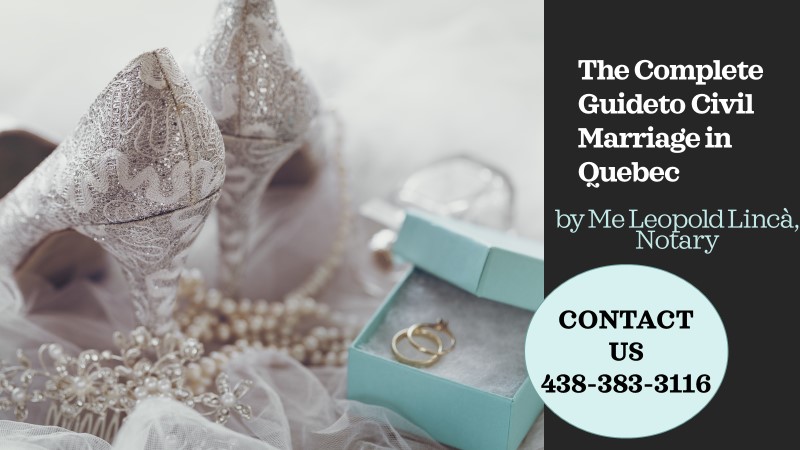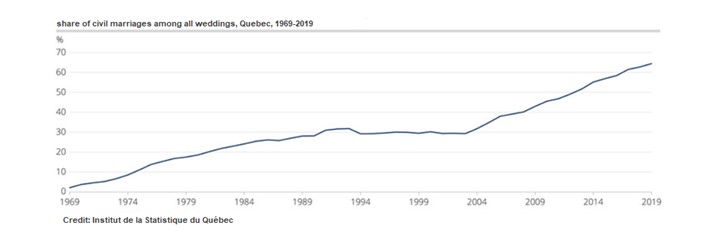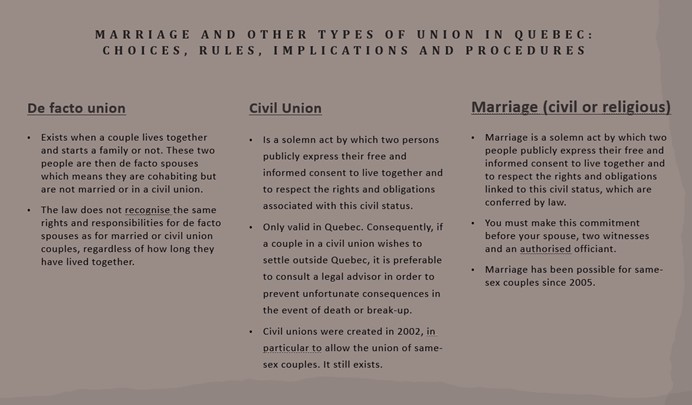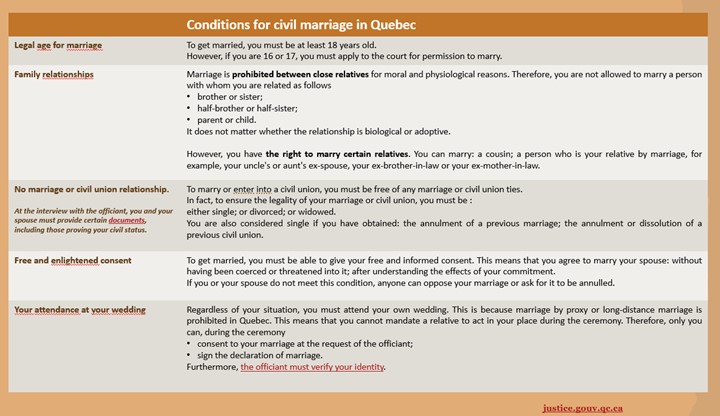Complete guide to civil marriage in Quebec. 2026
Everything you always wanted to know about getting married civilly and legally in Quebec
Introduction
By publishing the Complete Guide to Civil Marriage in Quebec, in 2021, Me Leopold Lincà, notary and wedding officiant in Montreal, Quebec, Canada, wanted to offer the public the fruit of his hard work in the field of family law and his reflections on the solemnization of marriage and other matters of general legal interest. The Complete Guide has quickly become a reference tool for students and universities in Quebec. His publications and his work are the subject of study for future generations of lawyers enthusiastic about the field of law and the details of human relations.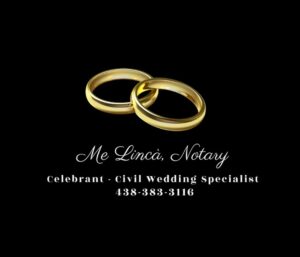
This webpage, the Complete Guide to Civil Marriage in Quebec, is a practical version in the form of question and answers. You will find everything you have always wanted to know about the steps, conditions, and procedures for a civil marriage in Quebec.
The world of civil marriage celebration in Quebec is my daily life, my specialty, and my passion. I hope I have managed to answer your questions clearly and concisely. Otherwise, we are always available to continue the discussion.
Since when does civil marriage exist in Quebec?
On April 1, 1969, the law on civil marriage came into force in Quebec, giving the possibility to a lay celebrant to formalize marriages, and this, elsewhere than in a place of worship. The authorized celebrants were then the prothonotaries and their deputies (called clerk and deputy clerk since 1994). Before the law, in order to be able to marry, non-practitioners had to “at least officially adhere to one of the religious practices recognized by the Civil Code”.
In addition, since remarriage after divorce is not permitted in the Roman Catholic Church, the majority religion in Quebec, divorced people who wanted to remarry had to go to another Church. In 1969, 98% of marriages were solemnized by a minister of religion, while 2% of couples were married civilly.
Percentage of civil marriages out of all marriages celebrated in Quebec since 1969.
The proportion of civil marriages has increased over the years to stabilize around 30% in the nineties. The new civil celebrants authorized in 2002 as well as the possibility for same-sex couples to marry, from 2004 led to a second increase in proportions and, in 2013, civil marriages became the majority. In 2019, the share of civil marriages in all marriages celebrated in Quebec reached 64%.
What is the legal age in Quebec? At what age can you get married in Quebec?
The legal age for wedding in Quebec in 1969 was fourteen for a boy and twelve for a girl, with parental consent. Civil marriage was governed by the Civil Code of Quebec.
Today, the legal age for civil marriage is 16. However, if you are 16 or 17, you can ask the court for permission to marry. The legal age for a civil union is 18 and unlike civil marriage, if you are 16 or 17, you cannot ask the court to authorise your civil union.
Is it possible to change my name after marriage in Quebec?
The spouses retain their names after marriage as defined in article 393 of the Civil Code of Québec.
However, the Directeur d’état civil du Québec may, for compelling reasons, accept a request for a change of name.
If you consider that you have compelling reasons to change your name, then you must send in a form that will be used to ask the Directeur de l’état civil to verify your eligibility to apply for a change of name and to assess whether the process is appropriate for your situation.
Eligibility for a name change application does not, however, mean that the name change will be automatically authorised by the Registrar of Civil Status of Quebec.
What are the differences between the various types of union? What are the differences between civil union and civil marriage in Quebec? Do de facto spouses have the same rights as those united by marriage or civil union?
Source: The Complete Guide to Civil Marriage in Quebec: Your civil we dding from A to Z
What are the differences between civil marriage and religious marriage in Quebec? What are the rules for a civil marriage celebration in Quebec?
The legal effects and the obligations of the spouses are identical for a civil marriage or a religious marriage. The course of the ceremony is similar in terms of the conditions established by law, to which cultural or religious aspects may be added.
The place of ceremony must respect the solemn character of the marriage in both cases.
Where there is a difference is in the acceptance by the officiant. The minister of religion may refuse to celebrate your marriage if it conflicts with the religious or moral precepts of the congregation, while acceptance by the officiant is mandatory if the conditions for civil marriage are met. For example, a notary cannot refuse to solemnize your marriage based on his own convictions.
What are the differences between civil marriage and civil union in Quebec?
In Quebec, marriage and civil union are similar in form and legal scope.
However, they have some differences.
The similarities:
- Thus, by this union, your couple publicly commits to live together and to respect the rights and obligations of your union. You must make this commitment in front of your spouse, two witnesses and an authorised officiant.
- Legal effects of civil marriage or civil union: the creation of a family patrimony; the choice of a matrimonial or civil union regime; the registration of a declaration of family residence.
- The conditions: To enter a civil union with your spouse, both of you must meet the same conditions as for getting married.
The differences:
- However, civil marriage celebrated in Quebec benefits from international recognition (with very few exceptions, especially concerning certain formalities for registering a marriage celebrated in Quebec in foreign registers/archives), whereas civil union, even when recognised in Quebec, may not benefit from the same international recognition.
- Age is another factor in the equation; in Quebec, to legally marry, the minimum age required by law is 16; to enter into a civil union the minimum age required is 18.
- Another notable difference – under certain conditions, the civil union can be dissolved by a ”JOINT DECLARATION OF DISSOLUTION OF A CIVIL UNION”, a deed signed by both spouses in civil union before a notary (the dissolution of the civil union by notarial declaration).
- Whether it is for a civil marriage or a civil union, the publication of the notice of marriage or the notice of civil union on the website of the Directeur de l’état civil du Québec must be done for a period of 20 days. However, there is an exception: a couple in a civil union who wish to marry – no publication is required when two people wish to marry and are already in a civil union. Both same-sex and opposite-sex couples can choose between a civil marriage and a civil union, there are no legal restrictions on this.
Is the Quebec civil union recognized around the world?
A civil marriage celebrated in Quebec enjoys international recognition (apart from a few very rare exceptions, especially concerning certain formalities for registering a marriage celebrated in Quebec in foreign registers/archives), whereas a civil union, even recognized in Quebec, may not benefit from the same international recognition.

Can a same-sex couple marry or enter into a civil union in Quebec? Does a gay marriage or a lesbian marriage have the same rights? Can an officiant refuse a wedding from the LGBTQ2S+ community?
Quebec is known for being ahead of other Canadian provinces and for its inclusion. For example, before same-sex marriage was legalised in Canada, Quebec had already opened the door in 2002 by creating civil unions.
In Quebec, since 19 March 2004, it has been possible for same-sex couples to marry. They can also choose civil union to unite.
In the event of separation or divorce, married or civil union same-sex couples benefit from the various protections provided by law, including family patrimony, matrimonial regime, and the right to support in certain cases. The rules applicable to married or civil union couples are the same for everyone, whether they are a same-sex couple or no
Since it is possible to get married without residing in Quebec, Quebec has been a preferred marriage destination for same-sex couples from outside Canada.
In many notary’s offices, such as that of Notary Lincà, the LGBTQ2S+ community is welcome to participate in any legal process and/or to celebrate a civil marriage.
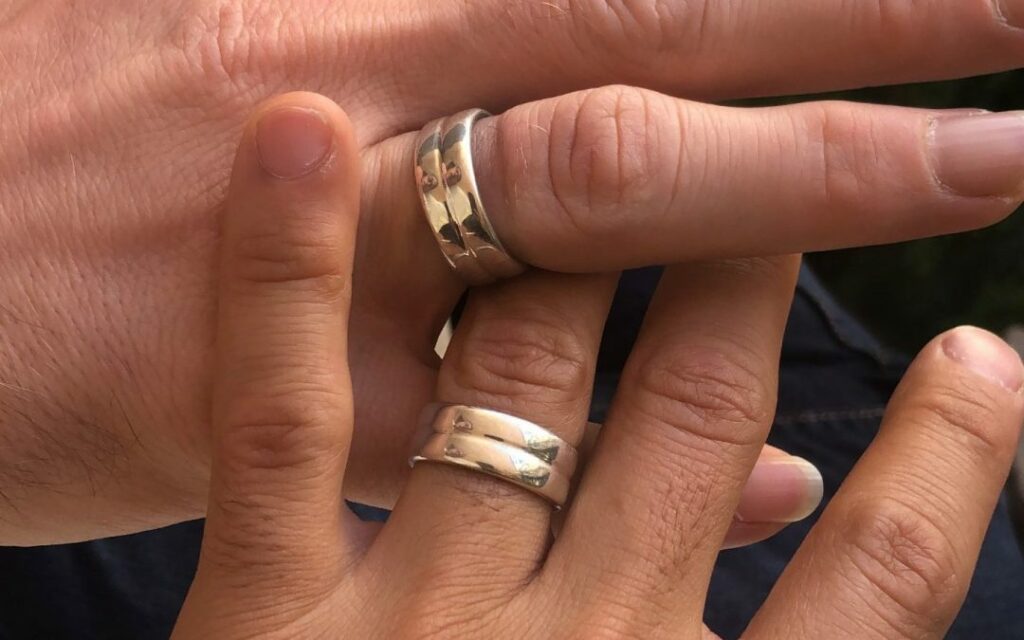
Can I marry a non-resident person? Can I get married in Quebec to a foreigner? What does the law say about civil marriage of non-residents?
Marriage in Quebec and everywhere in Canada is governed as to its basic conditions, by the Federal Law on Civil Marriage. The latter does not impose any citizenship or residency requirements to allow marriage. It is thus entirely possible to marry a non-Canadian and/or non-resident person.
The future non-Canadian and/or non-resident spouse must provide the same documents as a Canadian, i.e. two valid official photo IDs, the original of his or her birth certificate or act .
The document presented must mention the name of the parents and be written in French or English. If the birth certificate or act of birth is written in a language other than French or English, it must be accompanied by an official translation.
Find out more: Civil marriage of Non-Residents Act

What are the conditions, requirements and prerequisites necessary to get married in Quebec? What is required as a prerequisite for a civil marriage in Quebec? What are the procedures for a civil marriage in Quebec?
As summarized in the table below, you must meet the following conditions to get married civilly in Quebec.
You must be of legal age as prescribed by law.
You must not have a marriage or civil union bond. During your interview with the celebrant, he will ask you and your spouse to provide certain documents, including those to prove your marital status.
You must not be closely related, for both moral and physiological reasons.
You must be able to consent in a free and informed way, which is to say not to be forced to do so and to be able to consent to it freely.
Finally, you and your spouse must be present at your wedding.
What is the family relationship allowed for a civil marriage in Quebec?
Marriage is prohibited between close relatives for moral and physiological reasons. Therefore, you are not allowed to marry a person with whom you are related as follows
- brother or sister.
- half-brother or half-sister.
- parent or child.
It does not matter whether the relationship is biological or adoptive.
However, you have the right to marry certain relatives. You can marry: a cousin; a person who is your relative by marriage, for example, your uncle’s or aunt’s ex-spouse, your ex-brother-in-law, or your ex-mother-in-law.
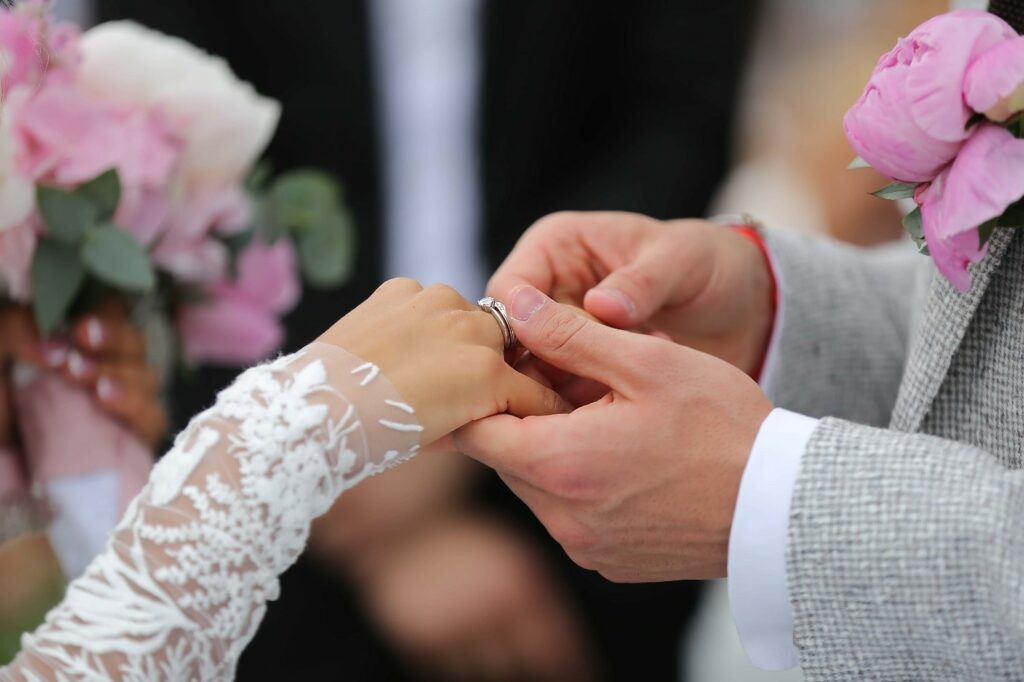
What is Free and Informed Consent? Why is this a prerequisite for marriage?
To get married, you must be able to give your free and informed consent. This means that you agree to marry your spouse: without having been coerced or threatened into it; after understanding the effects of your commitment.
If you or your spouse do not meet this condition, anyone can oppose your marriage or ask for it to be annulled.
Can I get married remotely in Quebec? Can I get married by power of atornery (mandate/proxy) in Quebec?
Regardless of your situation, you must attend your own wedding. This is because marriage by power of atornery (mandate / proxy) or long-distance marriage is prohibited in Quebec. This means that you cannot mandate a relative to act in your place during the ceremony. Therefore, only you can, during the ceremony
- consent to your marriage at the request of the officiant.
- sign the declaration of marriage.
Furthermore, the officiant must verify your identity.
How to choose the place of your civil marriage celebration in Quebec?
The steps involved in organizing a civil wedding in Quebec are crucial. The first step is to determine the location of your wedding, which is closely linked to the choice of officiant, since some officiants can only officiate in certain places.
The location chosen by the couple must respect the solemnity and decorum of a wedding ceremony and be appropriately arranged. The officiant must also be qualified and authorised to perform your marriage ceremony there.
The deputy clerk of the court or a court clerk, for example, are persons who are ex officio authorised to perform your marriage in the courthouse, or in another place where they are authorised to do so – detention centre, hospital, penitentiary, etc. A municipal official, councillor, mayor, etc., may only marry you in the town hall of the respective municipality, or in another place where they are authorised to proceed.
However, the notary officiating at the wedding or civil union, or the relative designated as a day celebrant, may marry you in any place that respects the solemn nature of the wedding celebration or in any place where he or she is authorized to proceed. In the case of the notary, it can be anywhere in the province of Quebec, and in the case of the relative, friend or family member designated as a day celebrant, it should be according to the authorization issued by the Directeur de l’état civil du Québec.
You are free to choose with your spouse where your wedding will take place.
You can marry your spouse, for example
- at the church in the municipality where one of you grew up or at the church whose architecture you like;
- at the courthouse;
- in a hotel reception room;
- in a park, garden or terrace;
- in a notary’s office.
Can I get married civilly at home? Can I have my civil wedding celebration at home?
You can even have your civil wedding at home, having your wedding ceremony at home. However, you must make sure that the venue:
- respects the solemn nature of the ceremony
- is set up for this purpose;
- corresponds to the place where your officiant is authorised to marry you.
Apart from a notary, who has the right to celebrate a civil marriage in Quebec? How to choose the celebrant of your civil marriage in Quebec? Where can I find a notary, civil marriage celebrant in Quebec? How to check if the celebrant is authorized by law to solemnize marriages?
In Quebec, for your marriage to be valid, it must take place before a legally recognized officiant authorized to perform marriages. This requirement applies to all marriages, whether they are civil or religious. If not, your marriage will not be recognised by law.
To be sure, you can consult the register of officiants of the Directeur de l’état civil of Québec.
CIVIL MARRIAGE
If you want to get married in a civil ceremony, your officiant can be a clerk or deputy clerk of the Superior Court, a notary, a lawyer, a mayor, a member of the municipal or borough council, or a municipal official.
You can also ask a parent, relative or friend to perform your marriage. However, first make sure that this person meets certain conditions.
RELIGIOUS WEDDING
If you prefer to be married in a religious ceremony, the officiant will be a minister of religion authorised to perform marriages according to your religion.
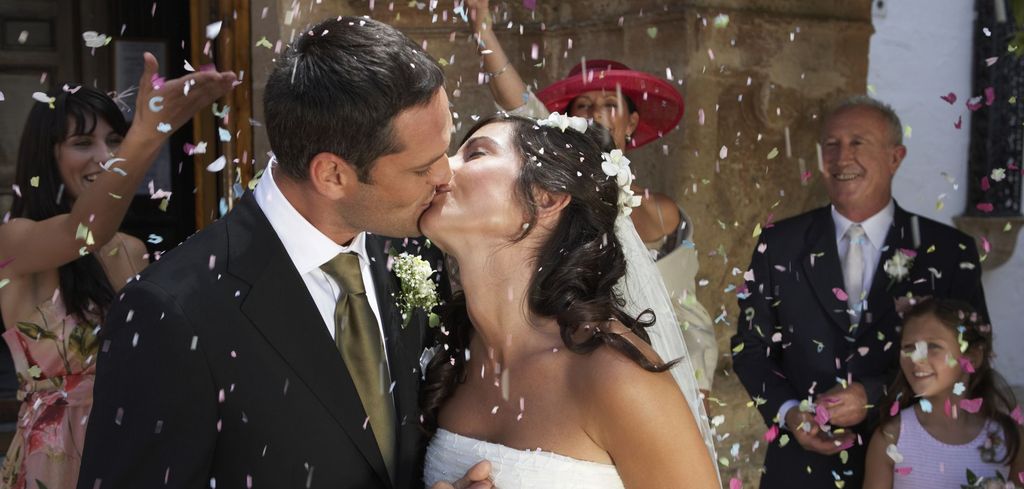
Can a celebrant refuse to marry me? Can I be refused marriage in church or in a place of worship?
Right of refusal for a religious officiant/celebrant:
A minister of religion has the right to refuse to celebrate your marriage if the conditions specific to his religion are not met or if there are impediments to your marriage according to it.
A notary cannot refuse to marry you according to his own conviction.
When can I get married? When can you get married civilly in Quebec? When can you get married at the Montreal courthouse? What are the times and days of marriage outside the courthouse?
Depending on the location of your civil wedding, there are certain constraints to consider when you choose the time of the ceremony.
CIVIL MARRIAGE AT THE COURTHOUSE
- If you are marrying your spouse at the courthouse, we invite you to contact the courthouse to find out the days and times of celebration, since these may vary according to the judicial district.
- Please note that your marriage celebrated by a clerk or deputy clerk of the Superior Court or in a courthouse cannot be celebrated on the following days
- Sundays; January 1 and 2; Good Friday; Easter Monday; June 24, National Holiday; July 1, Anniversary of Confederation; the first Monday in September, Labour Day; the second Monday in October; December 24, 25, 26 and 31; the day fixed by proclamation of the Governor General to mark the Sovereign’s birthday; any other day fixed by order of the government as a public holiday or day of thanksgiving
- At your interview, the officiant will confirm the time and date of the ceremony.
If you are getting married outside the courthouse,
- The ceremony must take place between 9 a.m. and 10 p.m. on the day you choose.
- However, if a clerk or deputy clerk is marrying you, you must keep the same schedule as if you were marrying your spouse at the courthouse.
- The officiant will agree with you on the date and time of the ceremony.
- A notary like Me Lincà notay and wedding officiant/marriage officiant in Montrel, Quebec can marry you on Sundays as well as all the holidays of the year and even on Valentine’s Day. What could be more romantic!
What is the language of civil wedding ceremony in Quebec?
The officiant must marry you in English or French.
You and your spouse can choose either of these languages. If one of you does not understand them, the officiant will ask you to provide an interpreter.
How to choose witnesses for your civil marriage in Quebec?
You must agree to take your spouse as your husband in front of two witnesses. The role of the witnesses is to:
1) to attest to your consent, i.e. to be able to testify to it if necessary
2) to sign your declaration of marriage.
What are the criteria for choosing witnesses for a civil marriage in Quebec? Who can I choose as witness for my civil marriage in Quebec?
The witness must understand his/her role. Therefore, you can choose whoever you want to be your witness. If your child meets this requirement, you have the right to appoint him or her even if he or she is not 18 years old.
Unlike the witness to the deed of marriage, the witness to your marriage does not have to know both of you very well, and you are not obliged to choose the person who attended the signing of the deed of marriage as your witness.
How does a civil marriage ceremony take place in Quebec? How is a civil wedding ceremony conducted in Quebec?
Depending on the wedding officiant chosen (notary, clerk, clergy, designated officiant, etc.) the duration of a wedding ceremony can range from 15 minutes to forty-five minutes and more, or even hours. If you choose Me Leopold Lincà notary as your wedding officiant, you can have a civil marriage or civil union ceremony that is tailored to your values and needs.
The civil marriage ceremony must follow the legal steps. The officiant will welcome you and your guests with a word of welcome. He will then read the relevant articles of the Civil Code of Quebec, namely articles 392 to 396. After the reading of the articles of the Civil Code of Quebec, the future couple or people in the audience may say a few words.
The couple then exchanges their consent to the union, the rings and their vows, and the officiant declares them united by the bonds of civil marriage or the bonds of civil union, as appropriate.
How much does a civil marriage cost in Quebec? What is the price of a civil marriage officiant? What are the rates for a notary wedding officiant of civil marriage?
The cost of a civil wedding / civil marriage varies greatly. It depends on the type of celebration (intimate or with many guests), the location, the program, etc. The cost can range from a few thousand to tens of thousands of dollars.
The notary, wedding officiant/marriage officiant in Quebec and Montreal fee and cost generally varies from $300 to $900 depending on his or her experience and the time of the civil wedding / civil marriage in Quebec. To this must be added the cost of the marriage contract, which is necessary if you choose a matrimonial regime other than partnership of acquests (the default regime in Quebec since 1970).
To this amount should be added the cost of the wedding rings, the bride and groom’s attire, the photographer, the reception hall, if applicable, etc.
These expenses are not mandatory. Also, more and more intimate weddings are being done nowadays. It is therefore quite possible, and increasingly common, to get married for an overall budget of $1000 or less.
What are the fees for getting married in Quebec or in a civil union at the Montreal courthouse or in front of a city official?
- At the courthouse (by the clerk) 291$ (plus tax)
- At the town hall (by the mayor or a representative of the municipality 291 $ (plus tax)
- Outside the Palace (by the clerk) 387 $ (plus tax)
- Outside the town hall (by the mayor or a representative of the municipality) 387 $ (plus tax)
How to organize my civil wedding in Quebec in summer?
According to the Institut de la statistique du Québec, in 2019, out of 22841 marriages, 10,096 marriages took place in the months of June, July and August, which represents more than 44% of the year’s marriages. It is clear that in la Belle Province, nearly half of all marriages take place in the summer. If we include the month of September, more than one out of every two weddings take place during the summer season.
Also, more than one in two weddings in Quebec is a civil marriage. What is available to future brides and grooms as a place to celebrate a civil wedding in summer?
The first place that comes to mind is the Montreal courthouse or any other courthouse in Quebec. Indeed, for a long time, civil ceremonies were naturally held there. Some people choose this option for a very private wedding in a courtroom. It takes about 90 days from the date of application to have a civil marriage celebrated. Also, the hours of celebration are from 9:00 am to 4:30 pm, and are not held on Sundays or holidays.
The notary marriage officiant may perform a civil marriage every day between 9 a.m. and 10 p.m., including Sundays and public holidays. The notary, as officiant, may officiate at any other location agreed upon with the future spouses as long as the location respects the solemn nature of the ceremony and is set up accordingly. Thus, by choosing a notary as officiant, the future spouses benefit from a wider choice as to the place where the ceremony will be held and the date and time of the ceremony.
In addition, waiting times with a notary are greatly reduced. For example, Me Lincà notary in Montreal, wedding officiant for marriage celebration can perform your civil union in as little as 21 days. Since the summer season is short in Quebec, this is an advantage to consider.
How to organize my civil wedding in Quebec in the rain? What if I am getting married outside and it is raining?
Getting married in Montreal or elsewhere in Quebec in the rain: Yes, I do!
As we have said, more civil weddings are held in Quebec in the summer than in all other seasons combined. Summer is the wedding season in Quebec.
This is the perfect opportunity to get married with an outdoor civil wedding officiant if you wish. Summer means sunshine and good weather… Yes, but not always. If what’s holding you back is the uncertainty of the weather on your big day, there are two important things to do.
The first is to plan ahead. If you’re getting married on the terrace in a hostel or restaurant, make sure you have an alternative, such as an indoor venue, in case of major bad weather.
Or choose a partially covered location, such as Notaire Lincà’s “Jardins Radieux” space, which allows you to be outside, in a country atmosphere even in Montreal, to be sheltered from a few drops of rain during your civil wedding celebration.
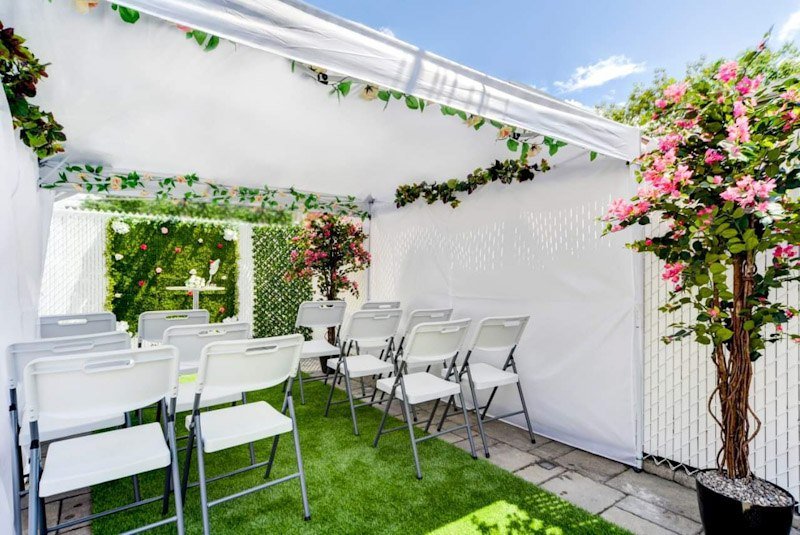
The second thing to do is to let go.
And now the weather forecast says that D-day will be R-day for rain. It’s time to make the best of it. A professional photographer will take exceptional photos, even in the rain. In fact, umbrellas are a great accessory to use, and give you an unparalleled touch of originality. If you’ve planned ahead, you’ll be delighted to use them.
There is only one thing left to do and that is to do nothing. As the saying goes, every cloud has a silver lining. Rain has its advantages, one of which is that it creates unique photo memories. But above all, rain is synonymous with romance. When you think of the most romantic films in history, scenes in the rain are a must.
Lincà Notary’s office, marriage officiant in Quebec, can testify to this, with beautiful photos taken for civil weddings in the rain and under pretty umbrellas. So much so, that some brides and grooms felt that it couldn’t be more perfect or romantic.
There’s an adage: “Rainy wedding, happy wedding”. If you want to have your civil wedding outdoors, in communion with nature, don’t let the vagaries of the weather hold you back.
How to organize my civil wedding in Quebec in winter?
A civil marriage in Montreal or elsewhere in Quebec under the snow: a warm idea!
While summer is the season for weddings in Quebec, many other weddings are celebrated in all seasons. Winter is also a season of celebrations and unions…. Even outside. Winter means snow, but it also means romance… Yes!
If you are having a civil wedding and decide to celebrate your wedding outside during this magnificent season in Quebec, you may want to choose a partially covered location, such as Notary Lincà’s “Jardins Radieux“ space, which allows you to be outside, in a romantic and flowery atmosphere, even in Montreal, for the duration of your civil wedding celebration.
A civil wedding in Quebec, in winter, is a great way to take pictures and create unique memories of your wedding ceremony.
For winter lovers or for international weddings, this unique touch of union is sought after. We wish you snow and unforgettable memories in photos!

How to annul a marriage in Quebec? How to get a marriage annulled in Quebec?
According to Article 380 C.C.Q., any interested person may request the nullity of a civil marriage if the conditions necessary for its formation have not been respected, and the court will decide, depending on the circumstances. Less than 3 years must have elapsed since the celebration unless public order is at stake. A marriage will only be annulled after a court judgment of annulment has been obtained. It is therefore very important to know the situations in which a civil marriage can be annulled, to see if your marriage can be annulled or voidable under certain conditions, and to avoid unpleasant surprises. There are several situations that can lead to the opening of a file for the annulment of a marriage or civil union:
- a marriage celebration that does not respect the character of publicity;
- a marriage celebrant who is not legally competent;
- the legal requirement of minimum age has not been met;
- a bigamy/polygamy situation;
- a court permission in the case of a minor spouse that was not granted;
- a prohibited degree of relationship between spouses;
- one of the spouses is incompetent or his or her consent is impaired by mental illness (advanced degree);
- lack of consent of one of the spouses, or consent given under duress or as a result of a mistake.
The annulment of a civil marriage by the Court does not, however, deprive the couple’s children of their rights, and leaves the rights and duties of the parents towards their children unaffected, but the annulment retroactively erases the effects of the civil marriage celebrated without having complied with the formal and substantive conditions. Articles 382 to 390 of the C.C.Q. also explain the effects of annulment with respect to the liquidation of all patrimonial rights, concerning gifts between spouses, etc.
Annulment or dissolution of a marriage
What are the civil marriage documents in Quebec?
Marriage documents are the ones you need to provide to identify yourself and prove your marital status. There are also the legal documents of the marriage: the notice of publication of the marriage; marriage contract and marriage certificate.
Other “consult a notary” documents:
Judgment of annulment of marriage/civil union; judgment of dissolution of civil union and notarized declaration of dissolution of civil union.
What is the Notice of Marriage Publication in Quebec? What is the Publication of a notice of marriage or civil union in Quebec and why is it necessary?
Quebec law requires that future spouses or common-law partners make public their intention to marry or enter into a civil union by publishing a notice of marriage or civil union on the website of the Directeur de l’état civil du Québec. Failure to do so without a waiver having been granted could result in the nullity of the marriage or civil union. However, no publication is required when two people want to get married and are already in a civil union.
It should be noted that, when receiving a request for publication of a notice of marriage or civil union, the Directeur de l’état civil of Quebec ensures the competence of the officiant.
The notice of marriage or civil union must contain the name and domiciliary address of each of the future spouses or de facto spouses, as well as the year and place of their birth, the name and capacity of the officiant, the date scheduled for the celebration and the address of the place of celebration. The accuracy of this information is attested to by a witness of legal age.
What are the deadlines for getting married quickly? I want to get married as soon as possible in Montreal, Quebec
Any notice of marriage or civil union must be published on the website of the Directeur de l’état civil of Quebec for 20 days before the date of the celebration. If the marriage or civil union is not celebrated within three months of the twentieth day of publication, the officiant must reapply for publication. If there is an error in the mandatory information, the officiant must make a new request for publication. If the date or place of celebration of the marriage or civil union changes, the officiant must ask the Directeur d’État civil of Québec to modify the notice of publication. However, the 20-day publication period and the obligation to proceed with the celebration within three months of the expiry of this period are maintained.
What documents do you need to provide to have your civil marriage published in Quebec?
Documents required for the interview with the wedding officiant for your marriage:
- Original birth certificates of both spouses – for those born in Quebec, the document is issued by the office of the Directeur de l’état civil;
- Two pieces of valid official identification, one of which must include a photo and signature (e.g., driver’s license, passport, or health insurance card);
- A document that proves your residence (with address);
- Divorce certificate (or irrevocable divorce decree), if applicable;
- Death certificate of the previous spouse in original, if applicable.
If one of the future spouses was not born in Quebec and his or her documents are written in a language other than French or English, the original documents should be accompanied by an official translation by a member of the Ordre Translator of Quebec, Terminologues et Interprètes Agréés du Québec.
Once this information has been collected and validated by a witness of legal age, the notary can publish the marriage notice on the website of the Directeur d’état civil of Quebec
When will I get my marriage certificate?
It should be noted that in order for a civil status document to be issued in relation to a birth, marriage, civil union or death, this event must first be registered in the Directeur de l’État civil Registry of Quebec. Only once the registration has been made is it possible to process an application for a certificate, a copy of an act or an attestation concerning this event. It is the role of the notary to ensure that your union is registered in the Civil Registry of Quebec.
As soon as this is done, you will receive a communication from the Directeur de l’état civil du Québec informing you that your marriage has been registered in the register of civil status of Québec and inviting you to submit your request to obtain your marriage certificate or act, either online at the register of civil status of Québec, or in person, by going to a regional service point of Services Québec or to a service counter of the Directeur de l’État civil.
Study Lincà notary makes this and many other steps easier. Contact us for more information.

What is a marriage contract? Do I need to have a contract for my civil marriage in Quebec?
It is not mandatory to have a marriage contract in Quebec. The marriage contract is used to choose a matrimonial regime other than the regime of partnership of acquests, which is the legal and default regime in Quebec. It also allows the spouses to specify gifts between spouses or to children and to specify certain provisions in the event of death. Since these provisions in the marriage contract can only benefit one of the spouses or children, it is a legal act with less scope than a will in which any person can be designated as a beneficiary.
You can conclude a marriage contract before the celebration of your union. However, you can also do so after the union. In this case, your marriage contract comes into force when it is signed instead of on the day of your marriage.
HOW MUCH DOES A MARRIAGE CONTRACT COST IN QUEBEC?
The cost of a marriage contract can vary depending on its complexity and the expertise of the notary. On average, it is prudent to budget between $400 and $1000 for a simple marriage contract. A more complex marriage contract will be charged at the notary’s hourly rate.
What is the default matrimonial regime in Quebec? What are the other matrimonial regimes in Quebec?
There are several types of matrimonial regimes in Quebec.
Partnership of Acquests
This is the default matrimonial regime in Quebec since July 1, 1970. It applies to all spouses married since that date who have not determined a matrimonial regime in a notarized marriage contract.
Under this regime, there are two categories of property: “proper” and “acquests”.
Private property is property that each spouse or civil union partner owned before their union and property that they receive during their union by gift or succession, as well as other property, rights and benefits provided for by law (articles 450 to 458 of the Civil Code of Quebec).
All property that is not private property is considered acquests (Articles 449, 459 and 460 of the Civil Code of Québec), and each spouse or civil union partner may administer his or her acquests and private property, provided that he or she obtains the consent of the other spouse to dispose of his or her acquests free of charge (Article 462 C.C.Q.) during his or her lifetime.
When a partnership of acquests is dissolved, each spouse or civil union partner may apply by law (Articles 465 to 484 C.C.Q.) for the partition of the acquests. Each spouse may have property of his or her own. The value of each spouse’s own property is not divided at the end of the regime.
What is separation as to property matrimonial Regime?
Under this matrimonial regime, there is only “own” property. Each spouse or civil union partner administers his or her own property and disposes of it as he or she sees fit. Spouses who have not established their matrimonial regime by notarized contract in separation of property before the marriage or civil union is celebrated are automatically assigned the regime of partnership of acquests by the C.C.Q. A marriage contract must therefore be made to be in separation as to property after the marriage.
What is community as to property matrimonial regime?
It is the old legal regime in Quebec, from before 1970, and it is still possible today to choose this matrimonial regime, but only by notarized contract and to make the necessary changes. People married without a marriage contract before 1970 continue to be subject to the provisions of community of property unless the spouses have subsequently changed their matrimonial regime by marriage contract.
How do I prepare for my civil marriage in Quebec? What are the steps for a civil marriage process in Quebec? Is there a checklist for civil marriages in Quebec?
- Choosing our wedding date and venue
- Choosing our officiant: why not our notary?
- Legal advice: ask our notary
- Marriage contract? Yes, or no? discuss with the notary
- Matrimonial regime: discuss with the notary
- Publication of the notice of our marriage on the website of the Directeur de l’État civil du Québec: The notary takes care of it!
- Our civil marriage ceremony with the chosen officiant
- Request our marriage certificate or act from the Director of Civil Status: see with the notary
Why choose Notary Lincà for your mariage / civil wedding in Quebec?
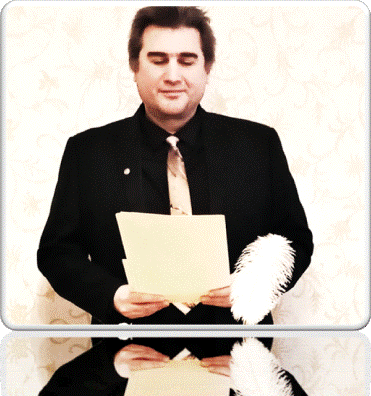
1) Experienced notary, specialized in civil marriage
2) Personalized service
3) Drafting of marriage contracts
4) Same sex marriages
5) International marriages
6) Customized legal advice
7) Strategic location in Montreal, not far from downtown
8) Two celebration rooms and the garden courtyard available
or we can move the celebration to the location of your choice
9) Great flexibility in wedding dates
10) Our availability from Monday to Saturday including some evenings
11) Competitive prices
12) Your civil wedding in as little as 21 days
Thank you!
Me Leopold Lincà Notary Legal Advisor and Wedding Officiant, 438-383-3116

